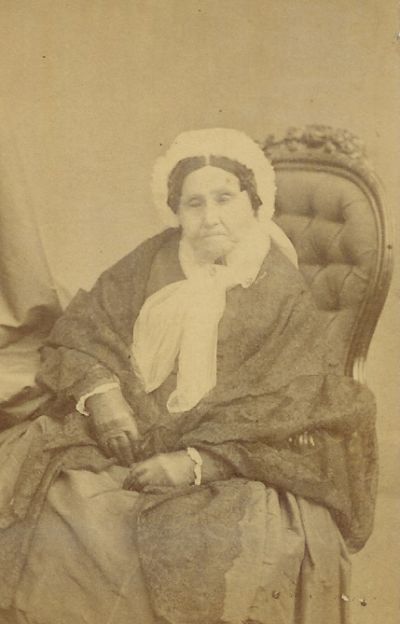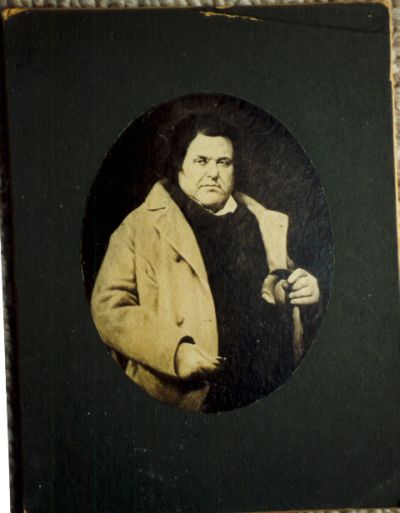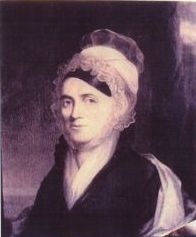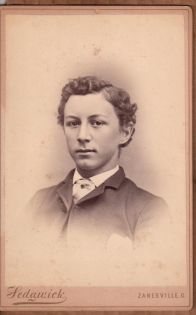
Frances Winans at age 100
photo courtesy of Michelle McKim
I first became aware of Frances ("Fanny") Winans when the obituary below was sent to me by Michelle McKim, whose husband is Frances' descendant. After adding it to our Winans obituaries page, I heard from another researcher, Cecily McNeil, who has provided further information.
Death of the Mother of the Hon. Wm. Stanbery, at the Age of 102 Years.
Died, in Newark, New Jersey, on the 7th of July, 1871, Mrs. Francis [sic] Finley, at the great age of 102 years. Her maiden name was Winans, of the New Jersey family of that name, a relative to Ross Winans [1-9-1-1-1-7], of Baltimore. She was born in 1768, and was married in 1783, to the late Dr. Jonas Stanbery (who died in Zanesville, Ohio), and afterward to Professor Finley, of Princeton College. Hon. William Stanbery, of Newark, Ohio, now 83 years of age, is her only surviving child, and made her a visit a couple of years ago.
Mr. [sic] Finley was a lady of strong intellect and cultivated mind, assisting Professor Finley in his studies. She was personally acquainted with General Washington, DeWitt Clinton, Washington Irving, Robert Fulton, and many others of the great and distinguished men of her period. Her father's house was frequently the resort of Generals of both armies in the Revolution, and she had a vivid memory of all the stirring events of that period in her vicinity. She was 8 years old at the commencement and 16 at the termination of the war, and was probably the last link that connected the present with the revolutionary history of New York and vicinity.
Newark (OH) Advocate, 21 July 1871
At first glance, the article appeared to be about the wife of a man named Francis Finley, but a quick search of census records turned up the 1870 Newark, NJ, entry of a 100-year-old woman named Frances Finley, living with a family that is possibly that of her daughter. Frances also appeared in the 1860 census in New York City, living with a different family. Michelle suggests that the subject of this obituary is the woman who is listed in Mrs. Egy's book as (1-4-1-9-2). I believe there's a good possibility that's true, but that more research must be done to establish the connection. Michelle writes:
I was able to find out more information on Frances's second husband. His name was Thomas Findley and, according to the New Jersey historical society, he was the headmaster at the Newark Academy, one of the oldest private schools in the country, from 1796-1802. The society has pastel portraits of both Frances and Thomas in their collection. He then served as principal of its Classical Department until 1809.

Frances Winans at age 100
photo courtesy of Michelle McKim
When I added Frances' obituary to our Winans obituaries page and invited readers to contribute information, I heard from Cecily McNeil, who said, "Here is the promised memoir of Jonas Stanbery by his son, Henry Stanbery, in a journal kept by him in 1857. I excerpt from his account of Stanbery family traits..."
We are not a family of habits, for we are wanting in that constancy and fixedness of purpose which leads to habitudes. My Father was the type of the race in this particular. He never owned an umbrella, or a cane, or a pocket book or a penknife or a watch, or a book, or a wardrobe. When he died there was not an article to keep as a memento of him. He used tobacco all his life, but never carried a plug, or segar, or a snuff box, and never bought an ounce of the weed in any form. Not from parsimony, but simply because he took more pleasure in asking for a chew of tobacco, than he did in chewing it. In truth his use of tobacco was all a pretense. He would put the smallest imaginable quantity on the end of his tongue and keep it there until the taste of tobacco made an impression on his nerves and then he would immediately eject it.
My Father, though not an educated man in the proper sense of the term, yet conversed with great accuracy of language and always preserved the manners and appearance of a gentleman. He assumed nothing, but his quiet, unobtrusive and dignified deportment earned universal respect. He had hardly any of the infirmities of age, bodily or mental. No rheumatism, no shakings of nerves or muscles, no chronic diseases, no garrulity. He had strong social feelings, but he preferred the society of the young to that of the old. Nothing was more annoying to him than long prosy talks of old people.
It was difficult to draw him out in conversation, for he was not a talker. He had no idea of display or of making an impression. When he did speak it was always to the point, in few and well ordered words. He had a few anecdotes, chiefly taken from his own experience, and when they came up, they were so short and always so apropos that no one regretted their repetition.
With all his gravity and dignity of manner, with all his reticence in conversation, he was eminently social in his tendencies.
Another peculiarity of my Father was, that although he had ample means, and made liberal provision for his household, he had no desire to own and improve a home for himself. The consequence was that almost to the end of his life he lived in rented houses. When at last, by the urgent solicitation of my Mother [Ann Lucy] he did purchase a residence, it seemed to open to him a new source of enjoyment. But even then he seemed rather to occupy it as a tenant than as an owner. It was too late in life for the formation of new habits and new tastes. He did not acquire and realize that sense of enjoyment which makes one's own home so pleasant and self-satisfying.
My dear Mother was in this respect his exact opposite. She had all homelike tastes--a model of order, neatness, and cultivated taste--so that in all our changes from house to house, there was always an air of comfort and propriety at once impressed upon the new habitation. It was perhaps her wonderful resources, under all circumstances, in making every thing comfortable and agreeable that impressed my Father with the idea that all household enjoyments could be found as well in a temporary residence, as in one's own permanent homestead. My mother felt otherwise. She long wished for a house she could call her own, and adorn and embellish and enjoy. At last her wish was gratified but alas, too late, for her health had failed, and was never restored. [I believe his mother lived until at least 1857, for he mentions a letter from her, earlier in this journal.]

William Stanbery, son of Jonas and Frances (Winans) Stanbery
photo courtesy of Cecily McNeil
The following biography of Frances Winans' first husband, Jonas Stanbery, was sent to us by Cecily McNeil, who said she received it from a Mrs. Mary Anne Denison Cummins, of Delaware, OH, in 1985. Mrs. Cummins is probably the granddaughter of Adaline Stanbery, who was the daughter of Charles Stanbery (1809-1892) (see photo below). Mrs. Cummins appears to be the author of the biography, and to have done a great deal of research, delving into old wills, deeds and other records in New Jersey, Ohio and New York:
JONAS STANBERY was born, probably in the "plantation" in Scotch Plains, Essex Co., N.J., on January 25, 1761. He probably received a good education, as it has been noted that all the children including the girls were well educated for that day. Perhaps he, along with the other boys in the area, enjoyed wrestling and shooting at marks.
It was long supposed that Joseph and Isaac, sons of Recompence by his first wife and half brothers of Jonas, were loyalists in the Revolutionary War. However, the Joseph Stansbury with whom Jonas's brother was confused--and who wrote songs and verses and was admittedly a loyalist--was born in England of British parents and emigrated to New York City in 1767. However, neither Joseph nor Isaac seems to have a military record, so they may have been none too enthusiastic about the Revolution.
Samuel and Recompence, full brothers of Jonas, were both soldiers of the revolution and thus away from home. Jonas's father died in 1777 when he was sixteen, and perhaps it fell on his shoulders to manage the farm and shop and keep an eye on the girls' behavior. At some time during his youth he received training as a physician, which probably meant that he bled people with his lancet and physicked them. Doctors were not held in high repute in this era, and no doubt Jonas was eager to take up some other occupation.
In 1784 a Fanny Winans of Elizabeth Town inherited some property from her uncle Elias1 and became a good prospect for a wife. Accordingly, Jonas made advances to her, proposed, and was accepted. (Perhaps she was a relative of Recompence's first wife and members of the family "got them together.")
At any rate Jonas and Fanny were married in January of 1795 [1785?] and lived happily for seven years, during which time they had four boys: Elias, Job, William, and Jonas, Jr.
At this time Jonas was beginning to speculate in selling land and had become prosperous. He was often away from home on business in New York City. One night (August 20, 1791) he was delayed by business but decided to go home anyway, arriving in the wee hours of the morning. Being cautious not to make a clatter and rouse the household, he lit a candle and, proceeding to the bedroom, he was about to climb into bed, when to his "great grief and astonishment" he discovered another person in bed with his wife--his own little brother, Jacob Stanbery, who had lived a few months in the family. Without waking them, he withdrew from the room and brought one of his laboring men in to be witness to the scene when the culprits were awakened.
Jonas continued to live with her for another eighteen months, and then sued for divorce because, as he stated to the court, her conduct didn't improve in that time.
Fanny, in her deposition to the court, claimed that Jonas had devised the circumstances relative to her having been found in bed with Jacob Stanbery and stated that in the time after the alleged adultery he had continued to live with her, and she had borne him two more children (daughters Frances and Catherine). She further stated that she had sacrificed her youth, beauty, and fortune to Jonas, and suggested that it would be a very convenient thing for him to divorce her and marry another woman with an even more ample fortune (did Ann Lucy have a fortune ??).2
However, the court, having heard the witnesses and the evidence, granted Jonas the divorce from Fanny and gave him custody of the six children. Jonas was ordered to return to Fanny the two pieces of property she brought to him in marriage (which she had inherited from Uncle Elias) and to pay her $125 at the time of release and $175 yearly on the third Monday in August at the Court House in Elizabeth Town between 10 and 12 a.m. during her lifetime. He was also ordered to pay a penal sum of $2500 as security for the payment of the annuity. The first payment was due in 1797 (August).
On March 5, 1797, Jonas and Ann Lucy McReady,3 widow of Robert Seaman, were married in New York City by Rev. Dr. Foster (from the card file: Newspaper Marriages, N.Y. State Library, Albany, N.Y.). It was Ann Lucy who brought up the six children of the first wife and bore Jonas seven more children (she had a daughter, Eliza, by her first husband).
Jonas is in the 1800 New York census4 in the city of New York, p. 96A:8. When his son Charles was born (Aug. 10, 1809), the family lived on 21st Street.
Jonas was, in the meantime, busy buying and selling land in Ohio. He sold the acreage to the settlers of Worthington, Ohio, and also was a patron for the first library there (unfortunately these books were sold off at public auction many years ago and few from the original collection can now be located). He sold Granville, Ohio, to the settlers from the Licking Land Company in Granville, Massachusetts; these people sent a coach to Hartford and New York City to bring him and John Rathbone, the speculators, to Massachusetts for closing the deal. Jonas paid his first visit to the village of Granville, Ohio, in 1809 and commented on the military bearing of the men, how they turned on their heels, and remarked facetiously that everyone seemed to have rank, ranging from high-fifer to captain.
In 1814 Jonas moved his family to Zanesville, Ohio.
Jonas was involved in sales of land in Licking County and one of the purchasers was John Denison in 1816! William Stanbery, Jonas's son, was a witness to the deed. I suppose they shook hands on the deal and exchanged a few remarks. Did Jonas go home and tell Ann Lucy, "I met the nicest young man today who bought some of that refugee property over in Licking County. He plans to clear the land, build a cabin, and construct a grist mill. He's a sober, straight-laced Methodist but an awfully nice fellow at that."
All of Jonas's children were well educated. Henry graduated from Washington College (now Washington and Jefferson) in Pennsylvania. Charles went to Ohio University in Athens. George died at sixteen when he was a student at the same institution in 1828. (Augustus died when he was ten.)
By tradition, Jonas was very "jealous" of any other male that Ann Lucy even glanced at. Having been deceived by a woman once, Jonas wasn't taking any chances on its happening a second time.
Another tradition is that Jonas kept a barrel of large pennies in the house from which the children and grandchildren were invited to help themselves.
Jonas made his will on May 4, 1839, and died on February 23, 1840, in Zanesville. Ann Lucy died on May 8, 1849. They are buried in Arch Section, row 34. of Greenwood Cemetery on Greenwood Ave. (route 40) in Zanesville.
Jonas's children were:
By first wife, Fanny Winans:By second wife, Ann Lucy McReady:
- Elias b. 1786 in Scotch Plains. He lived in Licking Co. in 1812 and 1813 but had died by Feb. 11, 1821, according to deeds. He is not the one who married Jane S. Hole.
- William b. Aug. 10, 1788, d. Jan. 23, 1873. Mar. Mary Shippy. Was a lawyer and congressman.
- Job b. ca. 1789 (?) Was a witness to John McIntire's will in Zanesville.
- Jonas, Jr., b. ca. 1790, d. Mar. 17, 1849 ae. 59. Probably unm. Bur. with Jonas and Ann Lucy. Maybe he was the one who remained unmarried in order to care for Ann Lucy.
- Frances b. ca. 1792. Mar. Nathan Findlay.
- Catherine b. ca. 1794. Mar. ----- Wise.
- (She had a daughter Eliza Seaman who mar. 1) Ebenezer Granger on July 13, 1815. He d. Sept. 17, 1822, and she had mar. 2) ----- Flanner by May 4, 1839, when Jonas mentioned her in his will.):
- Ann Lucy b. 1798 in N.Y.C. Mar. Maj. Thomas L. Pierce.
- Henry b. Feb. 20, 1803, N.Y.C. d. June 26, 1881. Mar. 1) Frances E. Beecher and 2) Cecelia Bond.
- Edward b. 1806, N.Y.C. A physician in Newark, Ohio. Mar. Augusta ----- (from deeds). No children.
- Augustus b. 1808 in N.Y.C., d. 1818 at 10 years.
- Charles -- next ancestor
- George b. 1812 in N.Y.C.; d. 1828 at 16 while attending Ohio University.
- Howard b. 1814 d. Sept. 25, 1893. Mar. Catherine Van Buren (Bur. Woodlawn Cem., Section W, Upper Portion, Zanesville)


Ann Lucy McReady, Jonas Stanbery's second wife
photo courtesy of Cecily McNeil
and
(possibly) Charles Stanbery, photo from eBay
Searches of the world wide web turned up further information about Jonas Stanbery and his family:
Each of these sites lists the same children as Mrs. Cummins does, plus an additional son, named Issiah, who may have been born about 1792. The first site lists Mrs. Cummins as one of its sources. Neither seems to add anything to our knowledge of this family. The data at one site, including minor variations in children's birth and death dates, seems to be nearly identical to that of the other.
We haven't been able to locate any information on Frances' second husband, Thomas Finley, or Findley, or whatever children they might have had. Nor have we located Frances in the 1850 U.S. census.